Can we restore the world’s coral reefs?
- Published
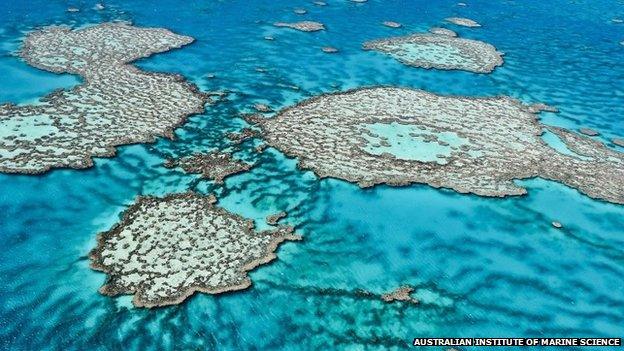
Even the Great Barrier Reef is having to face up to the challenge of a changing world
Advances in science could offer hope for the world's besieged coral reefs. Gavin Haines investigates.
Whether we are blowing them up with dynamite, dropping anchors on them or warming up the oceans they live in, mankind is leading a sustained attack on the world's coral reefs.
A recent report revealed that coral coverage on the Great Barrier Reef has declined by as much as 50% in the last three decades, while reefs in the Caribbean have seen reported losses of 80%.
However, experts claim advances in science could enable them to not only restore these beleaguered ecosystems, but also improve their resilience to disease.
"I believe we may have to moderate our predictions that coral reefs will not be here in 50 years," says Prof Eugene Rosenberg, a coral microbiologist at Tel Aviv University, Israel. "In fact, I'm one of the few people who are optimistic about the future of coral reefs."
Prof Rosenberg has reason to be sanguine having been credited with discovering a cure for White Plague, a disease that has devastated reefs from the Red Sea to Florida Keys.
"Bacterial disease in coral is a major problem and the changing environment - an increase in temperatures, an increase in pollution and an increase in algae - leads to a greater frequency and severity of bacterial infections in corals," he says. "White Plague is a prominent disease and we proved that a particular bacterium was the cause of it."
Having identified the bacterium, Prof Rosenberg gathered natural viruses from the sea - known as phages - and introduced them to the diseased coral.
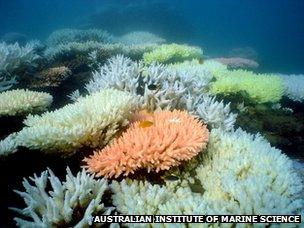
Bleached corals lose their colour as symbiotic algae are expelled
"We found phages that could attack and kill this disease," he says. "In the most recent study, we found that we could protect against inception and prevent the spread and severity of the disease.
"This is a natural phenomenon; we are just helping push the balance in favour of the phage."
Scientific shortfall
While Prof Rosenberg's work offers hope for reefs, he claims not enough scientific research is being done on coral disease.
"There are a lot of people working on coral reefs, but in terms of trying to prevent or cure coral reef disease there is almost nothing," says the 78-year-old scientist, who recently retired.
However, he believes reefs could survive without human intervention and plays down the dangers posed by climate change.
"People say global warming is happening faster than before and that coral can't adapt, but microbes - and there are thousands of them associated with each coral - can change more rapidly than we think," he says.
Field researchers are not so confident.
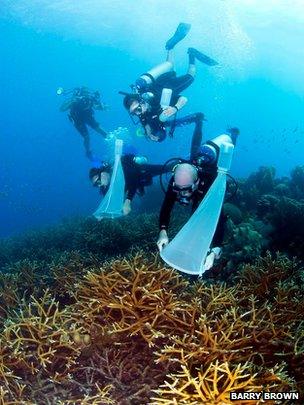
Collecting gametes on a reef
"We are already seeing the effects [of climate change] and we are seeing the effects more frequently," explains Tom Moore, a coral restoration coordinator at the the National Oceanic and Atmosphere Administration (Noaa) in Washington DC, US. "Corals are very sensitive to water temperatures and live in a very narrow temperature range."
When the water exceeds 30C, coral expels the algae living within it - a process known as bleaching - which turns the coral white and makes it more susceptible to disease.
Climate change is also attributed with acidifying the ocean, which prevents coral from developing.
"Corals grow by taking calcium carbonate out of the water and as the oceans become more acidic that process cannot occur," Mr Moore says. "If the oceans become too acidic, we could see coral dissolving."
Reef restoration
However, anthropogenic factors such as pollution, overfishing and fertiliser run-off pose a more immediate threat to coral.
These impacts vary from region to region; increased shipping is thought to be degrading Australia's Great Barrier Reef, while dynamite fishing and poor sewage management has damaged reefs in Southeast Asia.
In India, China and the US, one of the biggest problems is fertiliser running off farmland and into the ocean where it accelerates the growth of algae that suffocate coral.
"Changing attitudes is the greatest challenge we face," explains Dr Dirk Petersen, president of Secore, a German-based organisation that conducts research into coral reef reproduction. "We need to address the stresses put on coral."
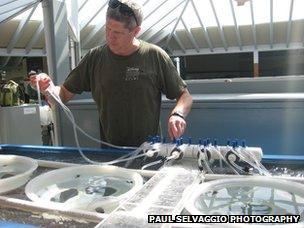
Coral larvae can be raised in nurseries before re-colonisation
Dr Petersen organises workshops around the world to educate communities about their coral reefs, which are a breeding ground for fish, support tourism and offer coastal protection from storms - ecosystem "services" worth an estimated $375bn per year to the global economy.
While Secore acknowledges prevention is better than cure, it is trialling reef restoration projects in Mexico, the Pacific island of Guam, and Curacao in the Caribbean.
Sometimes restoring a reef can be as simple as gluing broken coral back together, but to cultivate it from scratch, the process requires sperm and eggs - also known as gametes - that are obtained during mass spawning events.
Reef reproduction
Typically, spawning occurs just once a year and takes place at night on a full moon.
Once released, gametes float to the surface to be fertilised and if successful they will sink down to the seabed and grow into coral.
However, weather systems and human activity - such as fishing or shipping - can disrupt this process, so researchers like Dr Petersen collect gametes and take them back to the safety of the lab.
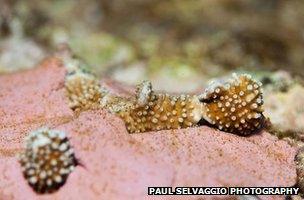
Reconstruction: Freshly outplanted Elkhorn coral using an epoxy cement
"We put sperm and eggs from different colonies together to increase the genetic diversity - this will make them less prone to disease," he says. "After they have fertilised and attached themselves to a substrate, we put them in nurseries out at sea."
The coral is left to grow in the nursery before being transferred to the reef - a process that can take up to a year.
The Noaa and Secore - which is currently featured in a coral reef exhibition at London's Horniman Museum - are amongst a handful of organisations to have completed successful trials of this technique.
"We have moved past the experimentation phase," says Mr Moore. "However, what we don't have is the money to do this work on a meaningful scale - the large investments we need to stem the tide just aren't there yet."
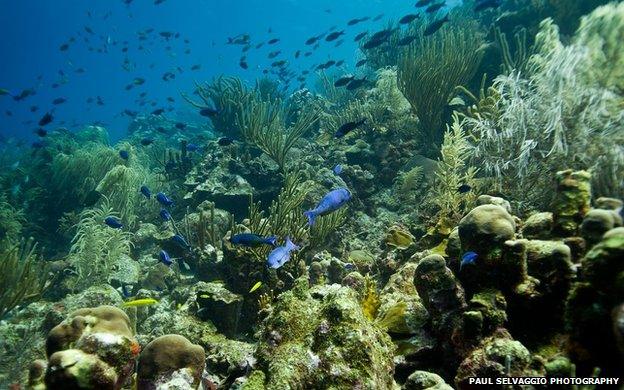
Coral reefs provide ecosystem "services" estimated to be worth $375bn per year to the global economy
- Published16 November 2012
- Published2 October 2012
- Published28 August 2012
- Published3 May 2013